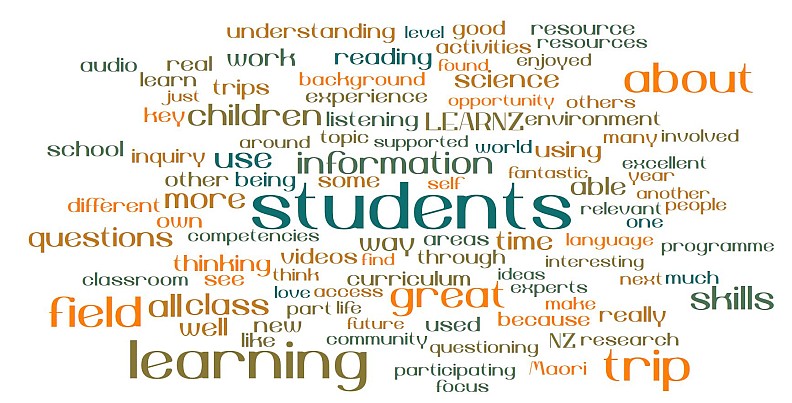You can contact LEARNZ, part of CORE Education, at:
Postal Address:
PO Box 13 678,
Christchurch 8141,
New Zealand

All aspects outlined in the planning for this field trip were easy to connect to the NZ Curriculum documentation. The newsletters were informative and useful, but I also found what I needed in the online help. My students have already asked when our next LEARNZ trip will be.
Meaningful and relevant content for students, pitched at an appropriate level for our multi-age classroom. Having the opportunity to interact and ask questions in real time was appreciated and is valuable.
Great for inquiry learning about Matariki and a good link with Tuia 250. Helpful to be able to replay the videos and do the quizzes to check learning and retention in a fun interactive way.
In the web conferences, I find the guest speakers and hearing the other schools' questions makes our learning authentic and relateable.
Topic relevant to students (and whanau). Videos well paced and interesting. Background pages provide an authentic independent reading activity. All of the key competencies are addressed through the various activities.
Perfect timing for Matariki. Tamariki were very connected with this field trip. Strong Social Sciences link around cultural ways of knowing.
Loved it! I have used LEARNZ field trips before but not with an ambassador, which just made it! This field trip was also incredibly empowering for our Maori and Pasifika learners!
Encourages thinking. Culturally responsive. Appropriate access to relevant and current topics for my Y10 Geo class.
The kids loved seeing our ambassador and reading her diary. Thank you.
It fitted in exactly with what we are studying, and my students really responded well to hearing information from different people and in different ways. The web conferences were particularly empowering and transforming for my four dyslexic learners, as their questions were chosen as "best and deepest".
A very integrated topic - you could could explore a myriad of Principles, Values and Key Competencies within it. LEARNZ trips are great - I like to participate in at least 2 every year and I love that I learn alongside my students.
Excellent that students could replay the web conferences, as they can view later to find answers to their questions and hit the pause button as often as they need.
The topic linked into our current Integrated Inquiry. Great resources on the website that the kids enjoyed interacting with.
My students loved it - it sparked lots of independent learning and sharing learning with whānau about Matariki. We fully participated in the web conferences, both as a listening class and as a speaking class.
This coincided with our Inquiry and the class were fully engaged with the content. The learning is accessible, with differentiated activities that allow the class to learn at their own rate. All the key competencies, principles, values and different learning areas were covered. Promoted inclusion of Māori students, who were encouraged to show their knowledge and share their views.
Students were excited to go on this virtual field trip and really enjoyed using Google maps. They were motivated to do the activities, which utilised all key competencies and encouraged multiple learning styles.
I have found the LEARNZ website an invaluable tool to support the learning needs of my class.
It followed on very well from the inquiry we have been doing into the plants in our local native bush. The most noticeable impact was a increase in our classes' scientific vocab. Great opportunity to communicate and collaborate with others outside of our school.
The Bioblitz field trip allowed our tamariki to further explore their learning context (insects) and to add to their understanding of an area of the science curriculum. The format of the field trip meant that what the children had already learned was given relevance and promoted further inquiry, conversations, excitement and engagement in this context.
It was really appropriate as we learnt how to do a Bio Blitz in our own backyard - which we did! Helped us in the key Learning Area of Science - provided extra information, motivation and a wider NZ focus on the environment. Also added to the kete of useful add-ons to make my teaching better.
The BioBlitz trip was an excellent activity in terms of supporting NZ Curriculum objectives in Science and Ecology for Levels 3 and 4. Science is a way of explaining the world and scientists work together to support their ideas. Ecology - students can see how organisms are adapted to their environment.
Stimulated students to look at environmental issues and biodiversity in our local area. From a teacher's perspective it was a simple way to get children engaged in learning using a digital tool.
The content was pitched perfectly for Year 7 & 8 tamariki. As part of our unit of inquiry based around ecosystems & biodiversity, there were strong curriculum links. The word bank helped build our te reo Māori too.
Helped my teaching practice, as this BioBlitz field trip was a helpful tool to differentiate my teaching. Students enjoy a different form of lesson delivery, too.
In this virtual field trip, the students studied creatures while learning about the concepts of biodiversity and conservation so we built our Inquiry around native animals. We decided to go to the Groynes and check out creatures there. We also looked at the wildlife at Willowbank.